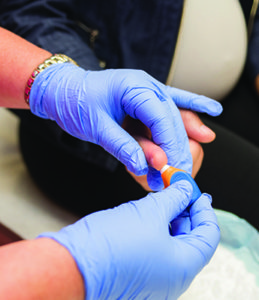Whether this is your first pregnancy or not, all pregnant mothers eventually find out about the “sugar test”: the dreaded orange, purple or even clear drink that all expectant moms must drink that tests for gestational diabetes. The goal is to have a normal (non-diabetic) result, but many women do end up with gestational diabetes, so we talked with our partners in Maternal-Fetal Medicine at Miami Valley Hospital to learn more about this common condition. We’re grateful for their expertise in this area and the resources they provide for Dayton moms!
What is gestational diabetes?
According to Dr. Samantha L. Wiegand MD, a Maternal-Fetal Medicine Specialist at Miami Valley Hospital gestational diabetes occurs when a woman’s body can’t overcome a carbohydrate intolerance. This intolerance to carbohydrates actually develops during all pregnancies, increasing in the second trimester and peaking in the third, but in a patient without gestational diabetes, the body can maintain normal blood sugar levels. In a patient with gestational diabetes, the body is unable to regulate blood sugar on its own.
What problems can gestational diabetes cause?
If this condition is left untreated or uncontrolled, the high sugar in the mother’s bloodstream can result in a negative impact on the health of the baby and the mother.
Most notably, untreated gestational diabetes can result in an unusually large baby. While the tendency is to think that a large baby means a healthy baby, when diabetes is at play, the increased size is not due to normal growth. Further, larger babies have increased risk of delivery complications and injury. They’re also more likely to require delivery by Cesarean section.
Babies exposed to untreated gestational diabetes may also face low blood sugar levels immediately after delivery, underdeveloped lungs and an increased lifetime risk of obesity and chronic diseases such as cardiovascular disease and type 2 diabetes.
How do I “get” gestational diabetes? Is there something I do to cause it?
Various risk factors can increase the likelihood of developing the condition. These include a family history of diabetes, increasing age, being pregnant with multiples and obesity. While it’s not a guarantee, you can do your best to prevent the onset of gestational diabetes by living a healthy lifestyle, one with plenty of activity and moderation in your diet.
How does my doctor determine whether or not I have gestational diabetes?
Here’s where the dreaded sugary drink comes into play. (Dr. Wiegand said there are a variety of flavors besides orange now, so that’s something to celebrate!) The test is generally run between 24-28 weeks of pregnancy. At your doctor’s appointment, you’ll drink the high-carbohydrate beverage and after a specific amount of time has passed, your doctor will test your blood sugar to determine whether your body was able to efficiently deal with increased sugar. If your blood sugar is above a certain threshold, further testing will be done (more of that drink – yay!) before making an actual diagnosis.

I have gestational diabetes. Now what?
The Maternal-Fetal Medicine physicians at Miami Valley Hospital are experts in the treatment of gestational diabetes. If you’re diagnosed, the first step will be nutritional therapy and lifestyle modification. Basically, your health care provider will sit down with you and discuss how to count your carbohydrates, how much protein to eat and what other lifestyle changes you need to make to best manage diabetes. If your blood sugar remains uncontrolled despite lifestyle changes, your doctor will work with you to determine proper medication.
Other resources at Miami Valley Hospital include a special program with nutritional training and education. They also have nurses dedicated to receiving calls at three sites who will relay questions directly to maternal-fetal medicine specialists.
How often does gestational diabetes stick around after delivery? Will I have it forever?
Women with gestational diabetes have an increased risk for the future development of overt diabetes, cardiovascular disease, and pre-diabetes. Those risks may be reduced with lifestyle modifications and possibly breastfeeding. Women should be screened for diabetes 4-12 weeks postpartum and then at least every three years thereafter.














